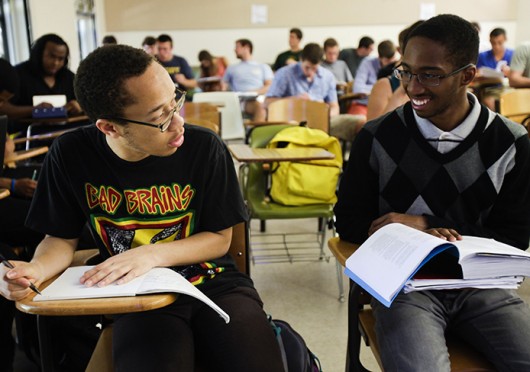
Spencer Simpson, left, and Kashawn Campbell chat before their African American studies class.
Credit: Courtesy of MCT
“Final examinations are as inescapable as death and taxes and just as dreaded.”
That’s the beginning of an article published in The Lantern in 1964, but with finals week approaching again, the stress still seemingly exists.
“Finals are awful. They’re kind of just like a marathon, and you’re on the final stretch, so it’s at that point where you can’t give up, so you have to just keep going,” said Nahila Sharif, a second-year in chemical engineering.
And Sharif is not alone, as finals have been the cause of stress for years, according to Lantern archives.
- Tom Daniels, an Ohio State graduate student in 1992, said the stress of finals week led to his decision to go to San Francisco after completing his exams — on a bicycle. He left Columbus Aug. 3, 1992, and arrived in San Francisco Sept. 6, 1992.
- In 1990, a university hospital director said the hospital regularly experienced a substantial increase in the number of stress-related incidents during the last week of class and finals week.
- In 1978, some OSU students were upset at the Saturday finals that were scheduled to take place. Furthermore, a group of Jewish students came together to form the Coalition Against Saturday Finals to protest finals being held on the Jewish Sabbath.
- In 1964, when the total student enrollment at the Columbus campus was 33,384 people, an article in the paper focused on the pros and cons of finals week in light of an impending change to the system. The overemphasis of final exams on overall grades was noted as a con.
That overemphasis is something some students today find problematic as well.
Erin Ponting, a second-year in molecular genetics, said she experienced that last semester.
“I had a class where (the final) was 50 percent of my grade,” she said.
Sharif also said overemphasis on finals is a problem.
“I do think it’s overstressed, and I think that’s kind of sad because some people are great students, but the stress can get to them,” Sharif said.
In 1958, an article explained the benefit of fraternity brotherhood during finals week.
“The life saver of many a fraternity man is ‘the files’ without which no house is complete. In this storehouse of pertinent information it is possible to discover that your economics professor does give objective questions like he said he never did,” the article read.
Two years earlier, The Lantern asked students when they started studying for finals. Answers ranged from all quarter to the night before.
One answer read, “A week before finals I look over my notes.”
In 2014, Ponting said she doesn’t just look over her notes — she rewrites them. Stephanie Borio, a current second-year in speech and hearing science, said she does the same thing.
In 1946, when the total student population was 24,867 people, a “finals week” had only been in existence for a couple of years. Prior to this, finals took place during the last two class periods of the quarter. An article in favor of the system change said the designated week allowed for students to have their exams more spread out.
However, the finals week system today, when there are about 57,466 total students at the Columbus campus, does not always work out that way for some students.
Borio said of her five exams, four of them were scheduled to take place on the Monday of finals week. After talking to her professors, she was able to get one moved to another day, leaving her with three Monday, which she said are practically back to back.
“There’s no time to reset or rejuvenate,” Borio said.
Stress doesn’t always win out, though. Back in 1923, the circus was in town the same week as finals. “The question of whether t’was nobler to stay home and study for a 7:30 final or to attend the circus arose in the minds of many Wednesday, and in several cases the circus won,” the article read. Not only were students in attendance, but two professors were spotted under the tent as well.
Students might not have the chance to attend the circus this week, but some have smaller ways to keep the stress under control.
“I like watching shows I like, like ‘Game of Thrones,’ or going out to dinner with my friends,” Ponting said.
For Sharif, catching up on rest is her go-to.
“Naps are a good study break because you don’t get much sleep to begin with, so sometimes just putting in that 30 minutes actually does help,” she said.
And for Borio, who said she doesn’t really have time for study breaks, just enjoying the nice weather for a few minutes helps her to de-stress.
“Walking from the library to home — that’s my time,” Borio said.
Finals are scheduled to take place Wednesday through April 29.


